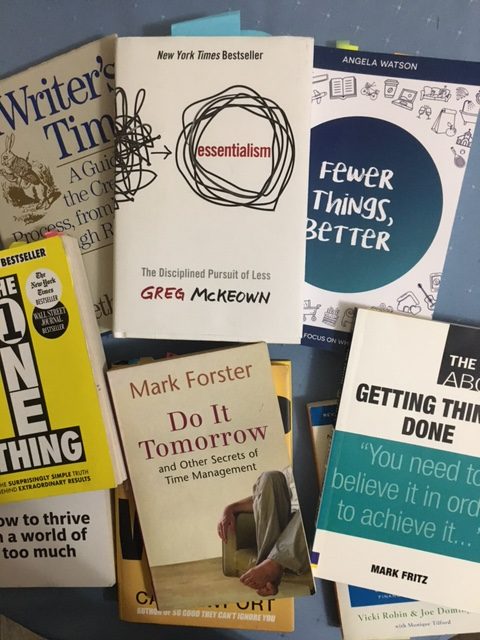A Time Management Article by Harold Taylor
Here are a few other books that I found valuable.
2006, Do it tomorrow: And other secrets of time management, by Mark Forster. Have you ever flipped through a book that you had read ten or more years earlier and immediately remembered exactly where you were when you had first read that book? If so, I would suggest it is a book with many highlighted passages, asterisks, and handwritten notations. At least that’s my experience. One of the many “aha” s in the book was Forster’s explanation of “busy work” vs. “real work.” I have no other book with so many handwritten notations. It was an inspiration for over a dozen articles. And I vividly recall those mornings at a coffee shop at St. Pete Beach in Florida, reading this book and making notes as I did so.
2008, The truth about getting things done, by Mark Fritz. Not to be confused with several other books with similar titles. It’s refreshing to read a book with brief chapters, (38 in all) all of which make a valid point. For example, Fritz makes the point in one chapter that it’s useless to try to use logic and facts to argue a point with someone who is emotional. You must deal with the emotions first. I notice I had written on one of the pages, “You cannot reason with a person who has lost his reason.” (I think it was a statement I had read in a book on working with Alzheimer’s patients.)
2013, The one thing, by Gary Keller. I loved this book for its chapter on multitasking. Never a clearer, succinct, and truer description of this illusion has ever been written.
2019, Fewer things better, by Angela Watson. Written by a teacher for teachers, this book has universal application. It inspired me to write a book on boundaries, because as Angela Watson claims, there’s an unprecedented number of things competing for our attention. Boundaries protect our time. You don’t have to be a teacher to profit from reading this book.
2020, Essentialism: The disciplined pursuit of less, by Greg McKeown. For me, this book was filled with ways and reasons to say no, even to myself. And I thought I had heard them all. Essentialism involves doing, accepting, keeping, using, and so on, only what is essential. For example, when decluttering, and we want to keep high-value items that we no longer use, ask yourself the question, “If I didn’t already own this, how much would I spend now in order to buy it?” That worked for me.
There are many other books that I particularly enjoyed reading, but almost any book on the topic you love should bring big rewards if you maintain an open mind and a searching attitude. If you don’t see an idea that has a direct application to your situation, let it be the catalyst in developing an application of your own.
And remember, there is power in reading.
Successful People Read. A Lot.
What do Warren Buffett, Mark Zuckerberg, Elon Musk and Oprah Winfrey have in common? They all read - a LOT! If you want to be successful you need to read. We have over 30 short ebooks designed to get you booked up fast!


